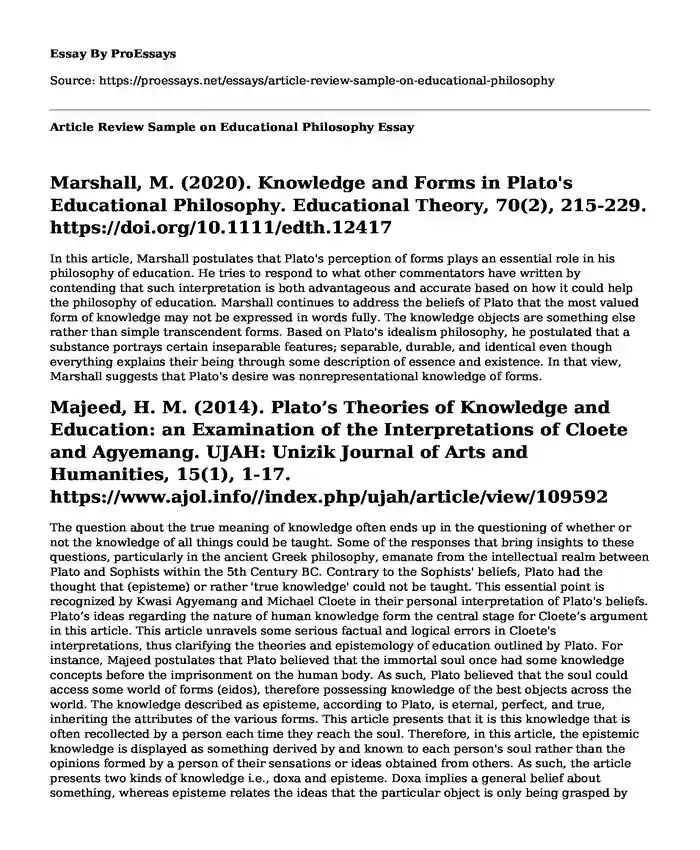Marshall, M. (2020). Knowledge and Forms in Plato's Educational Philosophy. Educational Theory, 70(2), 215-229. https://doi.org/10.1111/edth.12417
In this article, Marshall postulates that Plato's perception of forms plays an essential role in his philosophy of education. He tries to respond to what other commentators have written by contending that such interpretation is both advantageous and accurate based on how it could help the philosophy of education. Marshall continues to address the beliefs of Plato that the most valued form of knowledge may not be expressed in words fully. The knowledge objects are something else rather than simple transcendent forms. Based on Plato's idealism philosophy, he postulated that a substance portrays certain inseparable features; separable, durable, and identical even though everything explains their being through some description of essence and existence. In that view, Marshall suggests that Plato's desire was nonrepresentational knowledge of forms.
Majeed, H. M. (2014). Plato’s Theories of Knowledge and Education: an Examination of the Interpretations of Cloete and Agyemang. UJAH: Unizik Journal of Arts and Humanities, 15(1), 1-17. https://www.ajol.info//index.php/ujah/article/view/109592
The question about the true meaning of knowledge often ends up in the questioning of whether or not the knowledge of all things could be taught. Some of the responses that bring insights to these questions, particularly in the ancient Greek philosophy, emanate from the intellectual realm between Plato and Sophists within the 5th Century BC. Contrary to the Sophists' beliefs, Plato had the thought that (episteme) or rather 'true knowledge' could not be taught. This essential point is recognized by Kwasi Agyemang and Michael Cloete in their personal interpretation of Plato's beliefs. Plato’s ideas regarding the nature of human knowledge form the central stage for Cloete’s argument in this article. This article unravels some serious factual and logical errors in Cloete's interpretations, thus clarifying the theories and epistemology of education outlined by Plato. For instance, Majeed postulates that Plato believed that the immortal soul once had some knowledge concepts before the imprisonment on the human body. As such, Plato believed that the soul could access some world of forms (eidos), therefore possessing knowledge of the best objects across the world. The knowledge described as episteme, according to Plato, is eternal, perfect, and true, inheriting the attributes of the various forms. This article presents that it is this knowledge that is often recollected by a person each time they reach the soul. Therefore, in this article, the epistemic knowledge is displayed as something derived by and known to each person's soul rather than the opinions formed by a person of their sensations or ideas obtained from others. As such, the article presents two kinds of knowledge i.e., doxa and episteme. Doxa implies a general belief about something, whereas episteme relates the ideas that the particular object is only being grasped by the mind rather than interpreted.
Sahin, M. (2018). Essentialism in Philosophy, Psychology, Education, Social and Scientific Scopes. Online Submission, 22(2), 193-204.
This article presents the essentialist philosophy of education, which assumes that things and people have some essential and natural common features that are innate, inherent, and unchanging. However, Sahin notes that possession of the same essentials and common essence at the same levels could result in some undesired experiences in real life. The article also suggests that how individuals address themselves and others depicts their association between themselves and others. As such, essentialism significantly impacts individuals' ways of unification and differentiation. The article, thus, presents how essentialism could be adopted as the foundation for daily communication. In this article, Sahin also argues that essentialism in education emphasizes that essential and common skills and ideas of a particular culture ought to be taught to all the citizens, preferably at the same level, such as the primary school level. As such, the essentialism philosophy boosts the authority of teachers in the classroom, thereby promoting subject matter as the center of the curriculum. The core or essence of education is the curriculum, which is basically the combination of rigorous efforts and hard work. This article also presents the role of essentialism in unification is essentially represented in the core curriculum focused on transferring important skills and knowledge required for well-balanced and equal citizens. However, despite the importance of essentialism philosophy, Sahin notes that the discrimination aspect of essentialism is portrayed in natural sciences and politics as taxonomy. Thus, there are some important traditional ideas, concepts, and skills that ought to be taught to the methodically and thoroughly to all the students regardless of the individual's needs, ability, interests, and capacity. The fundamental aim of the essentialist education is to transfer cultural heritage and traditional knowledge of a particular society to the students. Concisely, this article postulates that a core curriculum ought to cover the basic unchanging natural laws as well as the surrounding environment.
Cite this page
Article Review Sample on Educational Philosophy. (2023, Nov 01). Retrieved from https://proessays.net/essays/article-review-sample-on-educational-philosophy
If you are the original author of this essay and no longer wish to have it published on the ProEssays website, please click below to request its removal:
- Problems and Solutions Experienced by English as Second Language Learners
- Effects of Reading to Infants and Toddlers on Their Early Language Development
- Essay on Ethical Relativism as an Explanation of Human Morality
- Essay Example on ADHD in Children: Common & Increasingly Prevalent
- Three Friends and a Fight: Friendship Put to the Test - Essay Sample
- Essential for Human Satisfaction - Essay Example
- Essay Sample on Virtuous Character According to Aristotle







